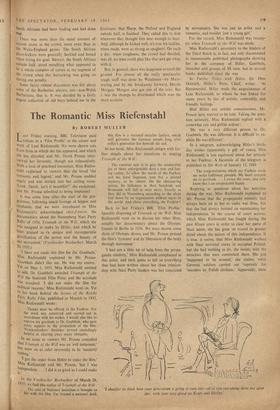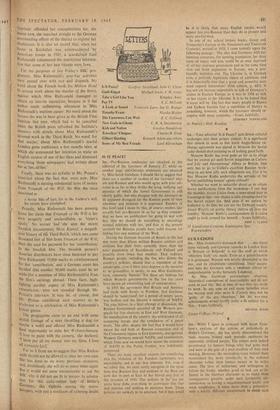The Romantic Miss Riefenstahl
By RORER T MULLER
LAST Friday evening. BBC Television paid tribute in a 'Film Profile' to the career and Work of Leni Riefenstahl. We were shown cuts float films in which she has appeared, and which she has directed, and Mr. Derek Prouse inter- viewed her fervently, though not exhaustively. With a look of practised innocence, Miss Riefen- stahl explained to viewers that she loved 'the romantic and legend.' and Mr. Prouse nodded sagely and was invited into her cutting room. 'Look. Derek, isn't it beautiful?' she exclaimed, and Mr. Prouse admitted to being impressed.
It was some time after the start of the pro- gramme, following much footage of hippos and elephants, that we were introduced to Miss Riefenstahl's acknowledged chef-d'a'uvre, the documentary about the Nuremberg Nazi Party Rally of 1934, Triumph of the Will, which, she was assigned to make by Hitler, and which he later praised as Ja unique and incomparable glorification of the power and the beauty of our movement.' (Voelkischer Beohachter. March 20, 1935.) :I have not made this film for Dr. Goebbels,' Miss Riefenstahl explained to Mr. Prouse. Goebbels didn't like me. He was my enemy.' 'Yet on May 1, 1935, Miss Riefenstahl omitted to add, Dr. Goebbels awarded Triumph of the Will the National Film Prize, and the accolade was accepted. 'I did not make the film for political reasons,' Miss Riefenstahl went on. Yet in her book Behind the Scenes of the Reichs Party Rally Film, published in Munich in 1935, MISS Riefenstahl wrote:
Thanks must be offered to the Fuchrer. For the work was conceived and carried out in accordance with his wishes. I would also like to express my gratitude to Dr. Goebbels, who gave every support to the production of the film. 'Frankenftiehrer Streicher proved exceedingly helpful in clearing away many obstacles.
In an aside to viewers Mr. Prouse conceded that Triumph of thew Will was an 'evil testament,' but went on to refer reverently to its 'masterly cutting.'
:I got the order from Hitler to make the film,' _Miss Riefenstahl told Mr. Prouse, 'but I was
independent.... I did it as good as I could make it.'
In the Voelkischer Beohachter of March 29, 1935, we find this notice of Triumph of the Will: The soul of National Socialism is brought to life with this film. Far beyond a national deed,
this film is a national socialist fanfare, which will galvanise the German people long after today's generation lies beneath the soil.
In her book. Miss Riefenstahl obliges with fur-' ther details about her intentions in making Triumph of the Will The essential task is to give the unutterable joy of those unforgettable days a new and last- ing reality. To allow the words of the Fuchrer and his loyal liegemen, now but a printed memory, to he reborn. On the shimmering screen, his followers in their hundreds and thousands will fall in once more. Exactly as they did in Nuremberg according to the plans laid down by an organisation without equal in the world, And above everything, the Fuehrer!
Back to last Friday's BBC 'Film Profile.' Speedily disposing of Triumph of the Will. Miss Riefenstahl went on to discuss her other films. notably her documentary about the Olympic Games in Berlin in 1936. We were shown some shots of Olympic divers, and Mr. Prouse praised the film's 'lyricism' and its 'liberation of the body through movement.'
'I had not a little bit of help from the propa- ganda ministry,' Miss Riefenstahl complained at this point, and took pains to tell us everything that had been written about her close relation- ship with Nazi Party leaders was lies concocted by newspapers. She was just an artist, and a romantic, and besides 'just a young girl.'
For the record, Miss Riefenstahl was twenty- six when Triumph of the Will was made.
Miss Riefenstahl's proximity to the leaders of the Third Reich is, in fact, not only documented in innumerable published photographs showing her in the company of Hitler, Goebbels, Streicher and groups of SS men, but in several books published since the war.
In Twelve Years with Hitler. Dr. Otto Dietrich, Hitler's Press Chief, writes: 'At Horumersiel. Hitler made the acquaintance of Leni Riefenstahl, to whom he was linked for many years by ties of artistic. comradely and friendly feelings.'
Had Hitler any artistic consciousness, Mr. Prouse next wanted to be told. Taking the ques- tion seriously, Miss Riefenstahl replied with a somewhat coy and girlish ardour: 'He was a very ditIeNnt person to Dr. Goebbels. He was different. It is difficult to ex- plain. He was different.'
In a telegram, acknowledging Hitler's birth- day' wishes (apparently a gift of roses), Miss Riefenstahl is less equivocal about her attitude - to her Fuehrer. A facsimile of the telegram is published in Die Welt of January 13, 1949.
The congratulations which my Fuehrer sends me make fulfilment possible. My heart compels me to gratitude ... 1 caress the roses, and only know that I am unspeakably happy.
Replying to questions about her activities during the war, Miss Riefenstahl explained to Mr. Prouse that the propaganda ministry had always been on to her to make war films. but that she had always insisted on maintaining her independence. In the course of court actions, which Miss Riefenstahl has fought during the past fifteen years in order to clear her name of Nazi taints, she has gone on record in greater detail about the nature of this independence. It is true, it seems, that Miss Riefenstahl worked with Nazi newsreel crews in occupied Poland. but she had nothing to do, she insists, with the atrocities that were committed there. She just 'happened to be around,' she claims, when German soldiers carried out 'reprisals' for 'murders by Polish civilians.' Apparently, these
'I shudder to think how your generation is going to turn out—all of you just sitting there day after day, with your eyes glued on Keats and Shelley.'
'reprisals' offended her susceptibilities for, she insists now, she marched straight to the German commanding officer of the district to register her displeasure. It is also on record that, when her house in Kitzbiihel was commandeered by American troops in 1945, a scandalised Leni Riefenstahl volunteered the unsolicited informa- tion that some of her best friends were Jews.
For the purposes of last Friday's BBC pro- gramme. Miss Riefenstahl's post-war activities were passed over with tact and dispatch. No word about the French hook Six Million Dead (a serious work about the murder of the Jews). against which Miss Riefenstahl managed to obtain an interim injunction, because in it the author made unflattering references to Miss Riefenstahl's wartime career. No- word about the lecture she was to have given at the British Film Institute last year. which had to be cancelled When the British press refreshed the Institute's memory with details about Miss Riefenstahl's devoted work in the Third Reich No word, for that matter, about Miss Riefenstahl's tearful London press conference a few months later, at which she announced her intention to make an English version of one of her films and dismissed everything 'those newspapers' had written about her as lies, all lies.'
Finally, there was no syllable in Mr. Prouse's interview about the fact that. even now. Miss Riefenstahl is earning substantial sums of money from Triumph of the Will, the film she once described as a heroic film of fact: for in the Fuchrer's will. his people have triumphed.
Proudly, Miss Riefenstahl has been pressing home her claim that Triumph of the Will is her own property and unclassifiable as `victor's spoils.' No sooner had she seen the recent Swedish documentary Mein Kanipf, a magnifi- cent history of th-e Third Reich, which uses some thousand feet of film from Triumph of the Will: than she sued for payment for her 'contribution
to the Swedish film. The Swedish picture's Austrian distributors have since hastened to pay Miss Riefenstahl 35.000 marks as reimbursement
for her 'contribution.' and a German court has decided that another 50,000 marks must be set
aside (for a nominee of Miss Riefenstahl's) from the film's earnings abroad. These facts, high- lighting another aspect of Miss Riefenstahl's
romanticism, were not revealed through Mr. Prouse's interview. It may be. of course, that Mr. Prouse considered such matters to be irrelevant to a celebration of Miss Riefenstahl's lyrical genius.
The programme came to an end with some stylish footage of a man throttling a dog (or maybe a wolf) and offered Miss Riefenstahl a final opportunity to state her Weltanschauung. 1 love to paint with the camera.' she declared. have put all my money into my films. I love all romantic [sic].'
Far be it from me to suggest that Miss Riefen- stahl should not be allowed to state her own case. She has done so on many previous occasions. and, doubtlessly, she will do so many times again. But it would not seem unreasonable to ask the BBC why it did not see fit to temper its admira- tion for this india-rubber lady of Hitler's Germany, this Ophelia among the storm- troopers, with just a modicum of sobering doubt.











































 Previous page
Previous page